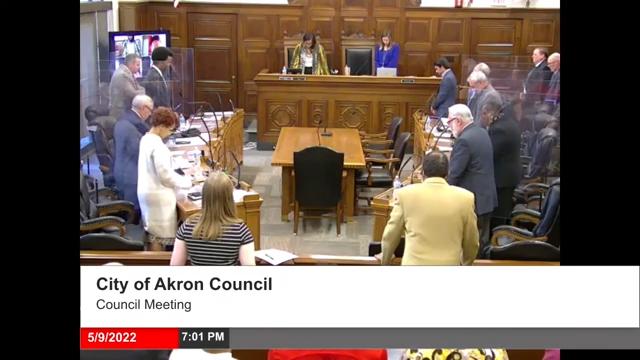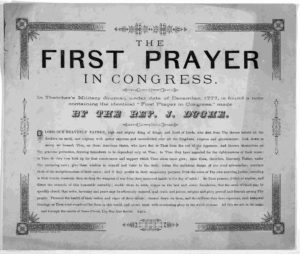Atheist activist group urges Akron, Ohio to end prayer at city council meetings
 AKRON, Ohio — A well-known professing atheist group that seeks to separate God from government is asking city council in Akron, Ohio to cease presenting prayers at public meetings.
AKRON, Ohio — A well-known professing atheist group that seeks to separate God from government is asking city council in Akron, Ohio to cease presenting prayers at public meetings.
The Wisconsin-based Freedom From Religion Foundation (FFRF) sent a letter to council President Margo Sommerville on Tuesday, advising that a “concerned resident” contacted the entity to lodge a complaint over the “consistently Christian prayer” at the weekly meetings.
It noted that a Christian organization, Love Akron, has been outsourced to supply faith leaders for the invocation, and at the May 16 meeting, a member of the council presented a Christian prayer.
“Opening meetings with a practice that excludes members of the community is contrary to an environment that ‘should be an inclusive and welcoming environment for everyone,’” the letter stated, quoting in part from one Muslim city council member. “Inviting other faith leaders to deliver prayers does not fix the wrong because prayer is a religious practice, which automatically excludes all nonreligious citizens.”
Parinita Singh, an Akron resident who does not identify with any religion, spoke out during the May 9 public comment period. Singh said that the Christian prayers make her feel “a little uncomfortable, … unwelcome and out of place.” It is not clear whether Singh is the “concerned resident” referenced in FFRF’s letter or if there was more than one complainant.
“And while I feel there should be no prayer at all in council [meetings], I think there should be more of an effort to not center every single week [on] Christianity,” she stated, noting that the invocation the week prior was delivered in the name of Jesus Christ. “[W]e should at least try to acknowledge other religions in Akron apart from Christianity.”
FFRF echoed Singh’s belief that the prayer practice should be discontinued altogether.
“The best solution to respect the diversity of Akron’s citizenry and to provide a welcoming environment is to discontinue invocations,” the letter asserted. “City Council members are free to pray privately or to worship on their own time in their own way; they do not need to worship in public on taxpayers’ time.”
Read the correspondence in full here.
The Akron Beacon Journal reports that Sommerville is open to having other religions represented at city council meetings. She said that council outsourced Love Akron because it became “increasingly difficult” to find volunteers.
“We’ve always needed help to find faith leaders to volunteer their time to come to council to open up with prayer,” Somerville told the outlet. “But it got to a point where it was difficult for council to schedule any faith leaders, whether they were Christian or any religion.”
As previously reported, the U.S. Supreme Court ruled in the 2014 case of Town of Greece v. Galloway that prayers presented primarily in the name of Jesus at public meetings are not problematic as long as they do not seek to “preach conversion.”
“To hold that invocations must be nonsectarian would force the legislatures that sponsor prayers and the courts that are asked to decide these cases to act as supervisors and censors of religious speech,” Justice Anthony Kennedy wrote on behalf of the majority.
“Absent a pattern of prayers that over time denigrate, proselytize, or betray an impermissible government purpose, a challenge based solely on the content of a prayer will not likely establish a constitutional violation,” he stated.

The first prayer delivered before the Continental Congress, offered by Jacob Duche of Christ Church of Philadelphia on Sept. 7, 1774, read, “O Lord our Heavenly Father, high and mighty King of kings, and Lord of lords, who dost from thy throne behold all the dwellers on earth and reignest with power supreme and uncontrolled over all the kingdoms, empires and governments: Look down in mercy, we beseech Thee, on these our American states, who have fled to Thee from the rod of the oppressor and thrown themselves on Thy gracious protection, desiring to be henceforth dependent only on Thee.”
The invocation concluded “in the name and through the merits of Jesus Christ, Thy Son and our Savior. Amen.”
“[I]t is the duty of nations as well as of men to own their dependence upon the overruling power of God, to confess their sins and transgressions in humble sorrow, yet with assured hope that genuine repentance will lead to mercy and pardon, and to recognize the sublime truth announced in the Holy Scriptures and proven by all history, that those nations only are blessed whose God is the Lord,” President Abraham Lincoln also declared in a national proclamation in 1863.
“But we have forgotten God,” he continued. “We have forgotten the gracious hand which preserved us in peace and multiplied and enriched and strengthened us, and we have vainly imagined, in the deceitfulness of our hearts, that all these blessings were produced by some superior wisdom and virtue of our own. Intoxicated with unbroken success, we have become too self-sufficient to feel the necessity of redeeming and preserving grace, too proud to pray to the God that made us!”
Read Lincoln’s proclamation in full here.
Become a Christian News Network Supporter…







Comments are closed.